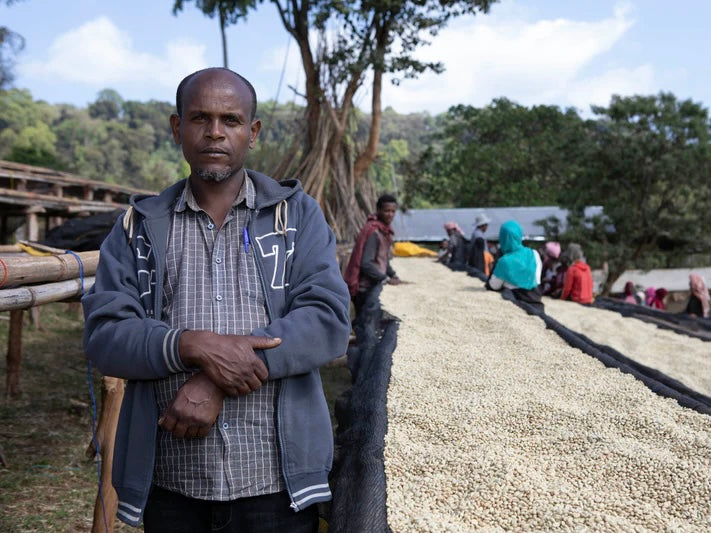
RIRIPA ORGANIC / ETHIOPIA
Riripa Organic / Ethiopia
Flavor profile:
The fruit and sweetness of papaya, orange, and peach, and the texture of black tea.
Papaya, Orange, Peach, Black tea.
Country of origin: Ethiopia
Locality: Oromia > West Arsi > Nensebo > Riripa
Refinery: Riripa Washing Station
Established: 2019
Producers: Approximately 742 people
Variety: Welisho, Kurume
Purification method: Washed
Certification: Organic JAS certification
Altitude: 1900 -2100masl
Average farm size: 1~2ha
Harvest period: 2022-2023

West Arsi coffee is different from traditional Ethiopian coffee, with a distinct, juicy fruit flavor that stands out rather than a delicate, bright tea-like flavor.
In the past, we have carried many coffees from this region, such as Duromina, Dumerso, and Nanochara. The coffee at every washing station was impressive and wonderful.
Riripa Organic is a coffee with bright fruit flavors like bright orange and peach, a hint of tropical fruit with a slight viscosity, and the flavor and texture of Ethiopian black tea.

The region of Riripa is highly regarded as a suitable land for growing coffee, thanks to abundant rainfall early in the season and occasional showers during harvest. This washing station was previously integrated with Haji Betro Washing Station. I have been purchasing Refisa and other coffee beans from Nensebo for the past few years, but this year is the first time I have purchased Riripa Washing Station coffee beans.
It cannot be compared to last year's Refisa, but like Danche, the sorting accuracy has improved during the pandemic, and the taste has a clearer fruit profile than last year's coffee from the same region. is also clearly visible.
When I went for cupping in Ethiopia in February of this year, I felt it was a little delicate. Now that it has arrived in Japan, I get the impression that the fruit is a little ripe. 
All coffee cherries are hand-harvested and rigorously sorted again before the refining process.
The coffee varieties grown in this region are Welisho and Kurume.
The pulp is removed using a standard disc pulper, then the fruit is floated on water and separated into Grades 1, 2, 3, and 4. We only buy the highest quality Grade 1.
The depulped parchment is soaked in a tank for 72 hours to remove the mucilage along with the water through fermentation. This fermentation tank is made of ceramic, which not only gives the coffee a clear appearance, but also accelerates fermentation and improves uniformity.
It is then thoroughly cleaned in a washing channel. This process uses water and also involves sorting based on density. This traditional selection method is used in Africa, including Ethiopia. Beans with high density sink and are considered to be of high quality grade.
After that, the parchment is soaked in clean water for 2 hours. After soaking, the parchment is transferred to an African bed drying rack, spread evenly to a thickness of 2 cm, and left to dry in the sun for approximately 10 days to 2 weeks.
Once dried, the parchment is transferred to a covered warehouse where it is manually removed from defective beans over a period of 2 to 4 hours for final finishing.

Product page 👇
Riripa Organic / Ethiopia 🇪🇹



